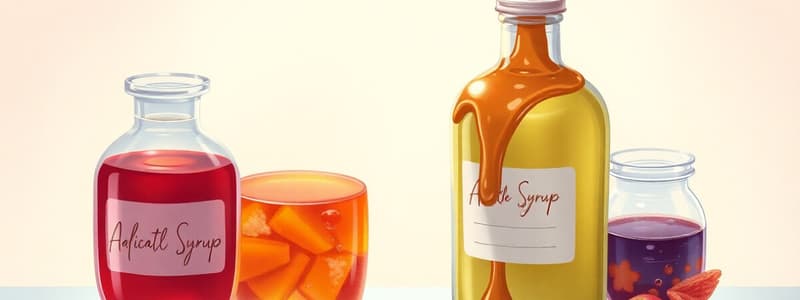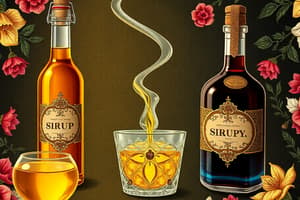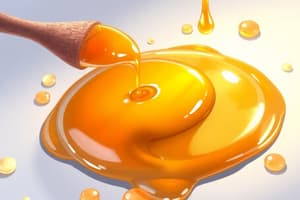Podcast
Questions and Answers
Which type of syrup is intended to provide therapeutic benefits?
Which type of syrup is intended to provide therapeutic benefits?
- Medicated syrups (correct)
- Flavouring syrups
- Sugar-based syrups
- Nonmedicated syrups
What is a benefit of using sucrose in pharmaceutical preparations?
What is a benefit of using sucrose in pharmaceutical preparations?
- It has a high moisture content.
- It is easy to handle. (correct)
- It is a color enhancer.
- It is more reactive than other sugars.
What occurs when sucrose undergoes hydrolysis?
What occurs when sucrose undergoes hydrolysis?
- It results in an increase in viscosity.
- It forms polysaccharides.
- It yields monosaccharides. (correct)
- It is converted to ethanol only.
What is the role of alcohol in certain syrups?
What is the role of alcohol in certain syrups?
Which preservative can be used in syrups to inhibit microbial growth?
Which preservative can be used in syrups to inhibit microbial growth?
What characterizes invert sugars obtained from the hydrolysis of sucrose?
What characterizes invert sugars obtained from the hydrolysis of sucrose?
What is an important factor in the inhibition of mould growth in sugar solutions?
What is an important factor in the inhibition of mould growth in sugar solutions?
Which statement about sugar-free syrups is correct?
Which statement about sugar-free syrups is correct?
Syrups can be classified into medicated and nonmedicated types.
Syrups can be classified into medicated and nonmedicated types.
Sugar-free syrups contain large amounts of sucrose for sweetness.
Sugar-free syrups contain large amounts of sucrose for sweetness.
Sucrose can be fermented and hydrolyzed, resulting in the formation of dextrose and fructose.
Sucrose can be fermented and hydrolyzed, resulting in the formation of dextrose and fructose.
The saturated solution of sucrose can encourage the growth of microorganisms.
The saturated solution of sucrose can encourage the growth of microorganisms.
Invert sugars formed from the hydrolysis of sucrose are less sweet than sucrose.
Invert sugars formed from the hydrolysis of sucrose are less sweet than sucrose.
Benzoate is a suitable preservative for use in syrups.
Benzoate is a suitable preservative for use in syrups.
Medicated syrups are intended to enhance the flavor of the medication.
Medicated syrups are intended to enhance the flavor of the medication.
Alcohol in syrups is used mainly for flavoring.
Alcohol in syrups is used mainly for flavoring.
Flashcards
Syrups
Syrups
Sweet, viscous aqueous liquids, often used medicinally. Divided into nonmedicated (flavoring) and medicated types.
Nonmedicated syrups
Nonmedicated syrups
Syrups used as vehicles for medicines, providing a pleasant taste. Primarily flavouring agents.
Medicated syrups
Medicated syrups
Syrups containing ingredients that have a therapeutic effect.
Sugar-based syrups
Sugar-based syrups
Signup and view all the flashcards
Sugar-free syrups
Sugar-free syrups
Signup and view all the flashcards
Sucrose hydrolysis
Sucrose hydrolysis
Signup and view all the flashcards
Invert sugars
Invert sugars
Signup and view all the flashcards
Preservatives in syrups
Preservatives in syrups
Signup and view all the flashcards
What are syrups?
What are syrups?
Signup and view all the flashcards
What's the difference between nonmedicated and medicated syrups?
What's the difference between nonmedicated and medicated syrups?
Signup and view all the flashcards
What are sugar-based syrups made from?
What are sugar-based syrups made from?
Signup and view all the flashcards
How do sugar-free syrups differ?
How do sugar-free syrups differ?
Signup and view all the flashcards
What happens when sucrose undergoes fermentation?
What happens when sucrose undergoes fermentation?
Signup and view all the flashcards
What is sucrose hydrolysis?
What is sucrose hydrolysis?
Signup and view all the flashcards
What are invert sugars?
What are invert sugars?
Signup and view all the flashcards
What are preservatives used for in syrups?
What are preservatives used for in syrups?
Signup and view all the flashcards
Study Notes
Syrups: Composition, Preservation, and Properties
- Syrups are sweet, viscous aqueous liquids, categorized medically as either nonmedicated (flavoring) or medicated.
- Nonmedicated syrups are used as palatable carriers for medicinal ingredients (e.g., cherry, orange, simple).
- Medicated syrups contain ingredients for their therapeutic effect (e.g., antitussives, antihistamines).
- Syrups are classified pharmaceutically by their base: sugar-based or sugar-free.
- Sugar-based syrups use concentrated sugar solutions (e.g., sucrose, dextrose), and sucrose is preferred due to its purity, sweetness, lack of color, ease of handling, and inertness.
- Sugar-free syrups use artificial sweeteners (e.g., sorbitol).
Sucrose Degradation
- Sucrose, a disaccharide, is susceptible to two degradation pathways: fermentation and hydrolysis.
- Sucrose in dilute solution serves as a nutrient for microorganisms (molds, yeasts).
- Signs of microbial growth include turbidity (color change), fermentation (odor change), and taste alteration.
- Sucrose concentration is important; saturated solutions, properly stored, inhibit mold growth.
- This occurs because a saturated solution contains no free water, acting as an anhydrous medium, inhibiting microbial growth and leading to shrinkage and lysis of microorganisms.
Syrup Preservation
- Preservatives suitable for use in syrups include benzoates, parabens, sorbic acid, and mixtures of methyl and butyl parabens.
- Small amounts of alcohol (not exceeding 10%) can be added as a solubilizing agent for alcohol-soluble ingredients and to prevent surface mold growth; alcohol evaporates, leaving concentrated alcohol behind.
Hydrolysis of Sucrose
- Sucrose hydrolysis, catalyzed by acid, breaks down sucrose into monosaccharides: dextrose and fructose.
- This reaction, called inversion, produces invert sugars (dextrose and fructose).
- Invert sugars are more easily fermented and sweeter than sucrose.
- Degradation of fructose (a product of hydrolysis) leads to the browning (caramelization) of some colorless syrups, particularly when acids are present.
Syrup Storage
- Syrups are typically stored at room temperature in tightly stoppered, well-filled bottles.
- Both saturation and refrigeration inhibit mold growth and inversion.
- Storage below 4°C can cause crystallization (difficult to re-dissolve).
Studying That Suits You
Use AI to generate personalized quizzes and flashcards to suit your learning preferences.




